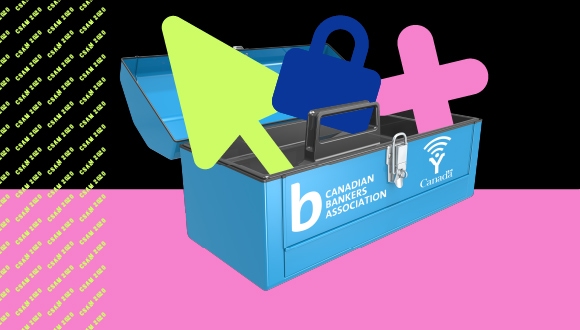In partnership with the Canadian Bankers Association. 
With so many of us working from home, it's important to address any security weaknesses you might have in your home office set-up. Here are some simple tips to ensure you are maintaining good security processes and procedures at home, even if your home office consists of a laptop and your couch.
Protect your devices
If you are working from your personal computer and mobile phone, make sure you take precautions to protect your devices:
Transcript
Stay Safe While Working From Home
Protect Your Devices
Use only the devices provided by your employer to benefit from the security measures they have in place.
Make sure your devices are protected with a strong, unique password , and lock your laptop and phone when not in use.
Use multi-factor authentication to access your devices when available.
Learn more at cba.ca
Association des banquiers canadiens
Canadian Bankers Association
- If you can, try to work only using the devices assigned by your employer. You will benefit from the security measures they have in place to protect you and the privacy of your work-related information. Check with your company for guidelines on ways to access your company’s network and files.
- Make sure your devices are protected with strong and unique passwords or passphrases for all of your online accounts – especially ones that access sensitive information like your bank account or email. This is important since a security breach at one site means your reused password could be handed to criminals who may try to use it on other websites. Whenever possible, set the screens on your devices to lock automatically after a set amount of time.
- Get in the habit of checking your mobile devices for old apps you don’t use and deleting them. Switch on "Offload Unused Apps" if available and check whether your mobile device offers any other app security controls. Older apps could be unsupported by the developer and could pose a security risk.
- If you download new apps onto your devices, be wary of phony or malicious apps. Only download apps from trusted vendors but be aware that even if you download an app from a reputable vendor, there’s still a risk that it could be malicious.
Secure your home Wi-Fi
Transcript
Stay Safe While Working from Home
Secure Your Home Wi-Fi
Change the default name and password for your home router , and automate installation of updates and patches to protect against the latest threats.
Learn more at cba.ca
Association des banquiers canadiens
Canadian Bankers Association
- Change the default network name (the SSID), Wi-Fi password and administrator password for your home router to something unique, strong and hard to guess.
- Be sure to automate installation of any updates and patches for your router to protect against threats.
- Considering setting up a guest network for visitors and smart devices.
Protect your privacy and the privacy of others
It’s important to separate work from home to protect your privacy, adhere to the privacy guidelines of your employer and protect the privacy of the members of your household.
Transcript
Stay Safe While Working from Home
Protect Your Privacy and the Privacy of Others
Securely shred all documents with personal information about you, your clients or your employer.
Protect your privacy and limit what appears in the background during video meetings.
Never save work-related documents or data on your personal devices.
Learn more at cba.ca
Association des banquiers canadiens
Canadian Bankers Association
- Separate work from home. Don’t save work-related documents or data on your personal device. Keep work separate and don’t let other members of your household use your work devices.
- Protect your privacy and limit what appears in the background during your video meetings.
- Back-up your personal files frequently to an external secure source. Also make sure you know how to restore your files from your back-up device and have a checklist in place to ensure those backups are happening regularly – very often you can schedule them to happen automatically.
Resources
The Canadian Bankers Association publishes a regular, free newsletter to help protect against cyber security frauds and scams.
Get Cyber Safe’s website has relevant, updated resources and guidance on how to protect yourself online.
CBA’s Cyber Security Toolkit for consumers has a cyber hygiene checklist and tips on how to spot common scams.